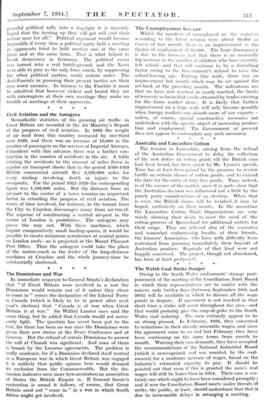The Dominions and War In immediate sequence to General Smuts's
declaration that "if Great Britain were involved in a war the Dominions would remain out of it unless they chose to come in" comes the declaration of the Liberal Party in Canada (which is likely to be in power after next year's election) that "Canada is at war when Great Britain is at war." Sir Wilfrid Laurier once said the same thing, but he added that Canada would not neces- sarily fight. The question has never been put to the test, for there has been no war since the Dominions were given their new status at the Peace Conference and at Geneva. But the refusal of certain Dominions to answer the call at Chanak was significant. And none of them is bound by the Locarno agreements. The problem is really academic, for if a Dominion declared itself neutral in a European war in which Great Britain was engaged it is unlikely that public opinion here would demand its exclusion from the Commonwealth. But the dis- cussion indicates once more how anomalous an association of States the British Empire is. If General Smuts's contention is sound it follows, of course, that Great Britain need not "come in" in a war in which South Africa might get involved.






































 Previous page
Previous page